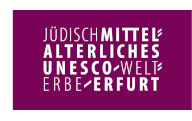Aims and Activities
The recent Erfurt rediscoveries and intense scientific research they have triggered significantly broadened the existing knowledge on Jewish settlement and cultural history of the early and high Middle Ages. The abundance of authentic architectural heritage can be put in context to the previous state of research chiefly based on written sources. On the other hand, material testimonies such as the Erfurt Hebrew Manuscripts have raised an entire set of new questions. In addressing these, further far-reaching insights on Jewish-European history can be expected over the forthcoming years.
Since 2009, two academic employees are concerned with the application process in the Erfurt municipality. One focal point of their work is to see to the continuation and deepening of research on the history of the medieval Jewish community in Erfurt and its integration into urban society, regional history as well as the European cultural area. In addition, analyses and further research of the preserved objects (see chapter 3) continue. The second focus is the coordination of the application process, synchronisation with municipal, state and federal partners as well as public representation of the project.
In order to involve political decision-makers and other key stakeholders into the application process from the outset, a steering group was established. Apart from the Lord Mayor of Erfurt and representatives from the involved departments, it consists of deputies from the City Council parliamentary groups, the Thuringian Jewish Community, the Thuringian Ministry for Education, Science and Culture (TMBWK), the Thuringian State Office for the Preservation of Monuments and Archaeology (TLDA) and the Erfurt Tourism and Marketing Ltd. What is more, an advisory board has been offering expert advice and support to the application from its earliest stage from different fields such as archaeology, history and history of art, building history or museology.
In order to further scientific research on the medieval Jewish community in Erfurt, their networking with other communities in Ashkenaz (the Central European area of settlement north of the Alps) and to link more closely the joint work on the history of Jewish communities in the Middle Ages, the State Capital of Erfurt regularly organises workshops and conferences, usually in cooperation with partners such as the University of Jewish Studies in Heidelberg or the TLDA.
What is more, the first volume of the newly established series "Erfurter Schriften zur Jüdischen Geschichte" (Erfurt Proceedings on Jewish History) was published in August 2012. Released on an irregular basis, it focuses on the state of work and latest research in disciplines specifically extending the knowledge on medieval Jewish heritage.
